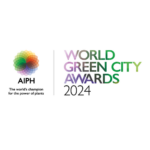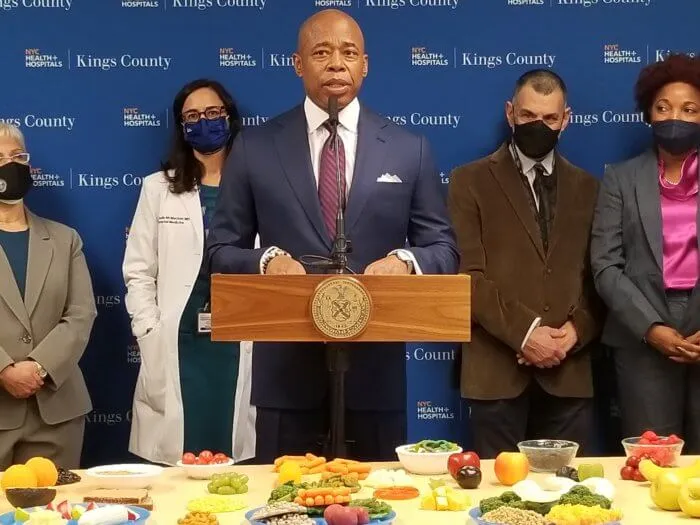Benefits of Urban Greening
Harnessing the Power of Plants
In the heart of New York City, a transformative movement is taking place—one that promises to reshape lives and has the potential to revolutionise healthcare. At its core lies a powerful concept: Lifestyle Medicine.
At the forefront of this shift is the remarkable impact of a plant-based diet. Evidence shows that embracing a plant-based lifestyle can dramatically reduce obesity and the prevalence of life-threatening conditions such as cardiovascular disease, hypertension, type 2 diabetes and even some cancers. This isn’t merely a dietary shift; it’s a shift toward healthier lives and thriving communities.
But the benefits don’t stop at personal wellbeing; they extend far beyond. By taking proactive measures to reduce the burden of chronic diseases, we are saving lives and safeguarding the financial health of our fellow New Yorkers and the healthcare system that serves them.
To truly usher in this transformative era of healthcare, education and accessibility are critical. New York City is making significant strides in this direction. We empower our residents with knowledge and access to valuable resources, ensuring the path to a healthier life is clear and attainable.
Our vision extends to the very heart of healthcare—our clinicians. That’s why, along with the American College of Lifestyle Medicine, we’re investing $44 million in the future of healthcare by providing free introductory nutrition and lifestyle medicine training to over 200,000 clinicians. Armed with this knowledge, our healthcare heroes can prescribe more than just medication; they can prescribe medically tailored meals that align with evidence-based guidelines.
Delivering Multiple Benefits
In 2021, New York City took a decisive step in reshaping its food landscape, driven by a commitment to enhancing health outcomes. Along this transformative journey, we recognised that healthier food choices not only benefit individual wellbeing but also have an impact on planetary health.
In April 2023, NYC unveiled its inaugural integrated greenhouse gas inventory, revealing that food-related emissions accounted for 20 % of the city’s total emissions—trailing only behind transportation and buildings. In response, NYC made a resolute commitment to reduce absolute carbon emissions stemming from food purchases by city agencies by 33 % by 2030. Furthermore, we’re challenging the private sector to reduce food-based emissions by 25 % by 2030.
The widespread adoption of plant-based meal options exemplifies the revolution in our food landscape. NYC’s health and hospitals lead by example, implementing plant-based defaults in all 11 hospitals, already reducing carbon emissions by 36 % this year alone.
NYC public schools have embraced initiatives such as “Meatless Mondays,” “Plant-Powered Fridays,” and “Chefs in the Schools.” Twelve diverse and renowned chefs citywide are training NYCDOE staff in culturally appropriate plant-based recipes.
The Department of Health and Mental Hygiene (DOHMH) has rolled out several food programmes, including “Health Bucks,” where individuals enrolled in SNAP benefits can receive $2 in “Health Bucks” for every $10 spent to purchase fresh fruits and vegetables at local farmers’ markets.
In the heart of NYC’s political and governance landscape, we are orchestrating a transformation that enhances public health and addresses planetary health.
The City’s Bold and Innovative Vision
New York City is transforming food policy, ushering in a vibrant food ecosystem centred on plant-based meals. We’re enhancing overall wellbeing by prioritising natural foods rich in fruits and vegetables. In 2021, we set new food standards, cutting back on meat, processed foods, sodium and sugars. By July 2023, every city agency serving the public embraced these changes. Our goal? Improved health outcomes, reduced healthcare costs and empowered residents.
In 2023, NYC Health + Hospitals is set to serve a staggering 800,000 plant-based meals, reducing carbon emissions by 36% and saving $500,000 in the past year alone.
In 2019, NYC Health + Hospitals/Bellevue launched a successful lifestyle medicine programme, sparking high demand, with over 850 patient requests in the first few months, resulting in better health. In February 2022, Mayor Eric Adams expanded this programme citywide across all five boroughs, bolstering staffing and introducing new roles like exercise trainers and psychologists. New sites launch in late 2023, with Bellevue already operational. NYC’s commitment to health is making a tangible difference.
Partnerships and Collaboration
In 2021, New York City took a bold step forward by establishing new food standards. However, we encountered the opportunity to navigate through outdated procurement rules and regulations, which empowered us to explore alternative vendors offering healthier food options that better aligned with our goals. Through collaboration and determination, we embarked on a journey to embrace nutritious choices and align ourselves with the new standards by July 2023.
Throughout this process, we fostered partnerships with various city departments, including the finance office, procurement officers, small business services and legal teams. Together, we sowed the seeds for a more accessible, affordable, sustainable and health-focused food system that also supported the local economy.
Our collaborative efforts extended to working closely with food vendors like Sodexo, the NYC Health + Hospitals provider. With their cooperation, we transformed their food offerings into a model of health, nutrition and sustainability. This transformation now serves as a beacon for Lifestyle Medicine, setting plant-based options as the default for lunch and dinner in all 11 inpatient hospitals.
In this journey, New York City has shown that by working together across city agencies, food distributors, food service providers and nutrition specialists, we can revolutionise our food culture and set the stage for a healthier and more sustainable future for all our residents.
Addressing Urban Challenges
The Issue
In New York City, a significant portion of our population, particularly those from low-income and Black, Latino, and immigrant communities, bears a disproportionate burden of chronic diseases. While Black New Yorkers only comprise around 22% of the overall population, they account for over 40% of premature deaths from cancer and heart disease. In 2021, Latino (15.6%), Black (15.2%) and Asian/Pacific Islander (11.9%) New Yorkers were more likely to self-report having diabetes than White New Yorkers (8.0%).
Furthermore, nearly 40% of our public school children are grappling with the challenges of being overweight or obese, disproportionately affecting Black and Latino students. Considering these statistics, implementing new food standards becomes imperative in our mission to combat the pervasive issues of obesity and chronic diseases that continue to afflict marginalised communities disproportionately.
New York City stands at the epicentre of a historic shift in food policy, characterised by a series of initiatives designed to cultivate a healthier population. However, individuals face barriers to accessing and affording healthy food options. We are committed to the ongoing implementation of food policy changes throughout the city to alleviate these constraints and level the playing field for all.
The Impact of the Issue
It is crucial to underscore that the monumental steps taken by NYC in redefining its food policies are imperatives. Failure to address these issues would perpetuate a cycle of suffering in marginalised communities, exacerbate healthcare costs, and set the precedent of unhealthy dietary habits in our children.
It is a fact that certain members of our community, especially our Black and Latino residents, bear a disproportionate burden of chronic diseases due to the unrelenting challenges of limited access to and affordability of healthy foods. By implementing plant-based nutrition citywide, we expose residents to healthier food options directly affecting health outcomes.
A Nature Orientated Future
This initiative holds the key to life-altering benefits. It doesn’t just bring healthier food options to your tables; it empowers you with knowledge. Through the pioneering Lifestyle Medicine clinics at NYC Health + Hospitals and our tireless efforts to instil food education in NYCDOE public schools, we are arming our communities with the wisdom to make informed diet choices. We’re nurturing lifelong habits of health consciousness in our youngest New Yorkers. The benefits of healthier eating echo far beyond our individual wellbeing. It reduces the prevalence of chronic diet-related diseases like type 2 diabetes, obesity and hypertension. Healthy eating elevates cognitive function, reduces absenteeism, nurtures improved mood and fuels more robust academic performance in our children.
However, our vision extends even further, profoundly impacting our local economy and environment. Collaborating with diverse vendors, we’re constructing a food ecosystem reliant on local and regional supply chains—this approach champions healthier living and job creation. We proudly stand alongside farmers and local food producers, cultivating abundant plants, vegetables, fruits, nuts and beans. This collective effort isn’t just about nourishing our bodies; it’s about nurturing our community and preserving the planet as well.
Nature Positive Solutions
Implementation
In 2019, under the leadership of then-Brooklyn Borough President Adams, a green revolution launched within New York City’s healthcare system. The Bellevue Plant-Based Lifestyle Medicine Programme was introduced, igniting hope for a more proactive, health-minded approach. Over 850 patients flocked to the programme within the first few months.
Fast forward to February 2022, when New York City Mayor Eric Adams, in collaboration with NYC Health + Hospitals (H+H), undertook a historic initiative. They expanded lifestyle medicine services, extending their reach to six public healthcare sites across the city to adult patients at Jacobi, Lincoln, Woodhull, Kings County and Elmhurst hospitals, along with Gotham Health, Vanderbilt. This marked the most comprehensive expansion of lifestyle medicine programming in the entire country.
This bold expansion resonates with NYC Health + Hospitals’ commitment to prioritising healthy eating and life-affirming habits in patient care. In 2019, they launched Meatless Mondays at all 11 acute care hospitals. This modest seed of change has flourished into a vibrant movement, with plant-based options becoming the default for lunch and dinner in all 11 hospitals.
By 2023, NYC Health + Hospitals will serve 800,000 plant-based meals. Beyond the individual health benefits, this endeavour promises a 36% reduction in carbon emissions. The result? A healthier city and planet. In the past year alone, these efforts have saved a remarkable $500,000, underscoring the transformative potential of sustainable healthcare. These achievements align with the city’s pledge to reduce overall food-based carbon emissions by 33% by 2030, ensuring a more sustainable New York City.
Feasibility
Under Executive Order 8, NYC took a significant step in 2022 by revising its food standards for all city agencies that serve food to the public. These updated standards strongly emphasise the procurement, preparation and serving of healthy and nutritious meals, with a primary focus on whole grains, fruits, vegetables, nuts, legumes and minimally processed meats. Additionally, the standards aim to reduce sugar and sodium content in meals.
The genesis of these standards can be traced back to the successful implementation of “Meatless Mondays” and the establishment of Lifestyle Medicine clinics in 2019. Building on this foundation, NYC Health + Hospitals has expanded its plant-based initiatives across the entire spectrum of patient care. One of the most noteworthy achievements is the groundbreaking collaboration with the American College of Lifestyle Medicine, involving a $44 million investment. This initiative has provided 19,000 clinicians with 5.5 hours of introductory training in Lifestyle Medicine, marking the world’s largest rollout of lifestyle-focused training.
NYC’s commitment to leading the charge in environmental sustainability is evident through NYC Health + Hospitals’ efforts. These accomplishments underscore NYC’s dedication to improving public health and driving positive policy changes and environmental impact.
Multi-Stakeholder Support
NYC has forged partnerships with organisations to advance plant-based initiatives. We’ve joined forces with the American College of Lifestyle Medicine to provide introductory training to 19,000 clinicians, marking the world’s largest lifestyle medicine rollout.
Additionally, we’ve collaborated with an online culinary school to create concise cooking skills videos for Lifestyle Medicine Programme patients systemwide. These videos cover healthy cooking across diverse culinary traditions, including Caribbean, South American, Central American and South Asian cuisines. They’ll be translated into Spanish, Mandarin, Bengali and Haitian Creole. Healthcare providers can easily share these videos with patients during or after visits via QR codes and patient portal links.
Our rollout of plant-based defaults in NYC Health + Hospitals was phased, beginning with Meatless Mondays in 2019 and expanding to plant-based lunch defaults in March 2022. Data from this phase revealed an impressive 95% acceptance and 90% satisfaction rate among patients. We continuously adapted menus based on patient feedback to reflect diverse cultural traditions. In September 2022, we extended the programme to include plant-based dinner defaults, coinciding with the launch of our Food Service Associate programme, which fosters one-on-one patient communication to gather feedback and preferences throughout the day.
Management and Maintenance
The initiative was implemented in stages, commencing with Meatless Mondays in 2019 and introducing plant-based lunch defaults in March 2022. Our culinary team adjusted menus based on continuous patient feedback, ensuring diverse cultural traditions were represented. In September 2022, we expanded the programme to include plant-based dinner defaults, coinciding with the launch of the Food Service Associate Programme.
In collaboration with Plant-Powered Metro New York (PPMNY), a local nonprofit, NYC Health + Hospitals offers 21-day “jumpstarts” to support our healthcare staff in adopting a healthful plant-based eating pattern rich in whole grains, legumes, fruits, vegetables, nuts and seeds. Our most recent jumpstart garnered nearly 1,000 applications, highlighting the strong interest among staff.
To further promote culinary literacy and interest in healthy cooking, our health system will partner with PPMNY to provide monthly healthy cooking demonstrations to our 45,000 staff members systemwide. These demonstrations will be available via live stream and on-demand recordings, celebrating diverse culinary traditions while emphasising accessible and affordable ingredients.
Measuring and Reporting Impact
Monitoring Results
Expanding Lifestyle Medicine programmes: We collect data on referrals, patient engagement, visit completion and attendance at programme components. We also track reported behaviour changes and clinical outcomes (changes in lipids, weight, blood pressure, hemoglobin A1c, and 10-year atherosclerotic cardiovascular disease risk score), examining them across patient demographics to address health disparities.
Training in Lifestyle Medicine: We monitor the number of health professionals and staff accessing education resources, including courses, jumpstarts, cooking demos and webinars.
Plant-based meals programme: We track the % uptake of plant-based options and measure carbon emissions annually through purchase evaluations.
Demonstrating Progress
NYC Health + Hospitals, in partnership with the City of New York, is making a commitment of $3 million to expand Lifestyle Medicine services. As the programme expands, this commitment will progressively increase to approximately $5 million annually. These funds will support staffing and programmatic services, including those generating patient care revenue, which is crucial for advancing Lifestyle Medicine across our healthcare system.
We are also enhancing our culinary programme by standardising menus, modernising infrastructure, and investing in culinary expertise to deliver high-quality, sustainable meals to patients.
Furthermore, through a groundbreaking partnership with the American College of Lifestyle Medicine, we are investing $44 million to provide free introductory nutrition and lifestyle medicine training to every New York healthcare practitioner. We’re forging a healthier, more sustainable future for our city.
Measuring Impact
Data from our plant-based meal initiatives revealed an impressive 95% acceptance rate and a 90% satisfaction rate among our patients. Our culinary team’s agility and responsiveness to continuous patient feedback ensured that the meals resonated with diverse cultural traditions.
In 2023, we anticipate serving a staggering 800,000 plant-based meals, a testament to our commitment to healthier, sustainable dining options.
Furthermore, since the adoption of plant-based dining, NYC Health + Hospitals has successfully reduced carbon dioxide emissions resulting from overall purchases by a substantial 36%.
Learning and Transferability
Adaption and Enhancement
Our journey began with small steps, introducing Meatless Mondays in 2019. By March 2022, we extended our commitment by making plant-based lunches the default choice. Our culinary team diligently incorporated continuous patient feedback, ensuring our menus reflected our city’s rich, diverse cultural traditions. In September 2022, the expansion continued, embracing plant-based dinners alongside the launch of our Food Service Associate programme.
The community’s enthusiastic response to our initiative fuels our determination. In 2023, we’re set to serve an astounding 800,000 plant-based meals, a testament to the programme’s resounding success. Data underscores this achievement, with an impressive 95% acceptance rate and a remarkable 90% satisfaction rate among our cherished patients.
We couldn’t have done it without our valued partner, Sodexo. Their unwavering support has been pivotal in adapting and implementing plant-based options across our hospital system. Together, we’re forging a path toward healthier, more culturally inclusive and sustainable meals for all.
Potential for Replication
The Healthy Eating Plant-Based Initiative by NYC Health + Hospitals began with a powerful goal: to combat chronic diseases, especially prevalent in Black and Latino communities. Our mission goes beyond health, though. We’re making waves in the fight against climate change, slashing carbon emissions by an impressive 36%. This aligns seamlessly with our city’s recent pledge to slash food-related carbon emissions by 33% by 2030.
We’re not just leading by example; we’re challenging our private partners to step up, aiming for a 25% reduction in food-based emissions. This builds on our 2021 commitment when we signed the Cool Food Pledge, vowing to cut emissions by 25%.
And the impact extends beyond health and the environment. Embracing plant-based meals has driven remarkable cost savings, with a whopping $500,000 in expenditure reduction this year alone. We’re creating a healthier, greener and more fiscally responsible future for all.
Inspiring Other Cities
Our global partnerships are sparking a worldwide movement! Leaders from across the globe have flocked to NYC Health + Hospitals’ culinary centre in Brooklyn to learn about our groundbreaking default programming. Guests included luminaries from Denmark, such as the leader of the nutrition board at Bispebjerg and Frederiksberg Hospital, UC Health, Promedica-Ohio Health System clinical dieticians, and sustainability consultants. We’re proud to collaborate with international visionaries committed to a healthier, more sustainable world.
By sharing our knowledge and expertise, we aim to inspire our national and international partners to embrace similar policies, setting the stage for a future where health and sustainability go hand in hand. Together, we’re creating a compelling global movement!
Resilience
Reducing Negative Impacts and Ensuring Sustainability
Leveraging the Good Food Purchasing Programme (GFPP), we’ve embraced an innovative and transparent approach to meticulously track and measure our progress in sustainability across our entire food procurement cycle.
GFPP empowers us by establishing a comprehensive set of metrics, enabling rigorous data collection and implementing a robust scorecard system. It’s a beacon of transparency, promoting accountability and encouraging continuous improvement. Our annual reporting further underscores our commitment, ensuring our practices align with our sustainability goals.
This holistic approach guarantees that our sustainability efforts are well-documented and perpetually assessed and refined. We’re forging a path toward a more environmentally responsible and health-conscious future.
Environmental Considerations
There are a variety of environmental benefits associated with a plant-based lifestyle. Through our plant-based meal default option in our public hospital system, we’ve reduced greenhouse gas emissions, reduced land use, decreased pollution and saved water. Food production is responsible for 30% of human-generated greenhouse gas emissions worldwide. Meat has been identified as the food source that produces the most greenhouse gas. Studies show that decreasing meat consumption could reduce greenhouse gas emissions while improving overall health outcomes and reducing chronic disease. The meat industry is twice as responsible for pollution than producing fruits, vegetables and grains.
Research shows that transitioning to a plant-based lifestyle can decrease pollution by 49%. Plant-based lifestyles may play a role in water conservation. 24% of global freshwater is used for livestock, and it takes 23% less water to produce 1 kg of grain than 1 kg of beef. One study found that reducing animal intake would reduce global water use by 14%.
Additionally, plant-based diets may improve water quality by reducing eutrophication caused by animal feed runoff.
Use of Natural Resources
Food production is responsible for 80% of deforestation and is the most significant contributor to biodiversity loss. Since meat and dairy production consumes most agricultural land, it is one of the biggest threats to species biodiversity. Biodiversity is essential to the resiliency of our food systems.
























